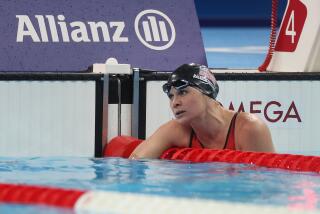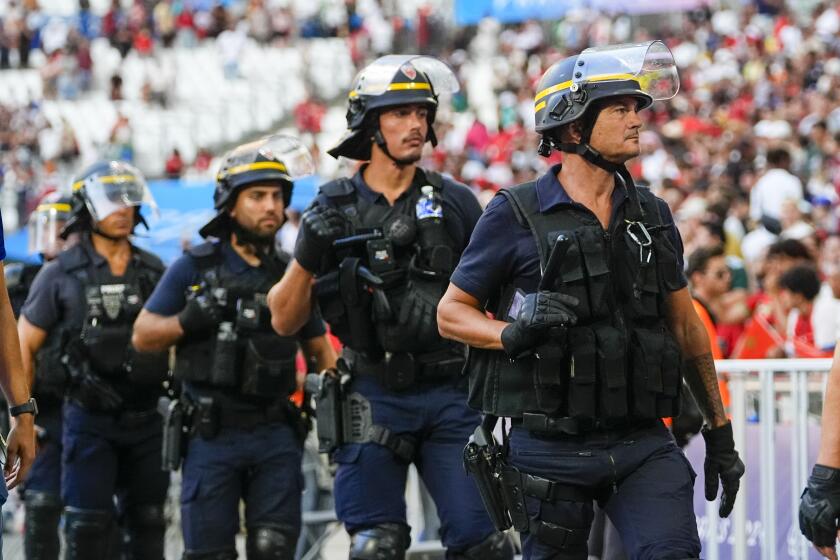‘84 Olympic Documents Shredded
Prince Alexandre de Merode of Belgium, chairman of the International Olympic Committee’s medical commission, confirmed Monday that documents concerning positive drug tests during the 1984 Olympic Games in Los Angeles were destroyed before he examined them, but he said that he believes the episode resulted from an accident and not a cover-up.
“This was a small incident,” he said. “It’s not a scandal.”
Since arriving here for this week’s Centennial Olympic Congress, members of the IOC’s executive board have responded with a similar lack of concern about a recent BBC television report alleging that test results were stolen from De Merode’s office in Los Angeles and shredded in a conspiracy involving officials of the IOC and the Los Angeles Olympic Organizing Committee.
“You’re talking about something that’s 10 years old,” IOC Vice President Kevan Gosper of Australia said. “I think we would be better served to discuss medical commission issues that are pertinent now.”
Another board member, Anita DeFrantz of Los Angeles, said: “It’s pretty old news. I don’t know why it’s being brought up now.”
The IOC’s director general, Francois Carrard, said last week that the executive board would seek information from De Merode during the medical commission’s report scheduled for Sunday. When Carrard learned, however, that De Merode would be detained in Belgium until Monday, he said the executive board might not pursue the matter.
“It’s not on the agenda,” Carrard said.
Upon arriving in Paris on Monday, De Merode told the Associated Press that five or six test results were destroyed, not nine as reported by the British television network. He also disputed the BBC’s claim that he knows the names of the offending Olympians, saying that the code numbers used to connect the athletes to their tests were shredded before he had an opportunity to identify them.
“Nobody knows,” he said.
De Merode said he believes the documents, most of them involving tests conducted during the final two days of the Games, were victims of the LAOOC’s efforts to save money as the committee shut down as many operations as possible after the closing ceremony.
When de Merode returned to his office in the Biltmore Hotel on the night after the Games ended, he said he discovered that it had been reconverted into a suite.
“I called the organizing committee and was told, ‘You must understand, you are in the United States. The Games are finished, everything is finished,’ ” he said.
He said he went to LAOOC offices the next day to inquire about the medical commission documents, including the drug test results, and was told by the organizing committee’s chief medical officer, Tony Daly, that they had been sent to IOC headquarters in Lausanne, Switzerland.
When De Merode said he would travel to Lausanne to inspect them, Daly changed his story, according to De Merode, who said he was then told: “I must tell the truth. Everything was destroyed in the paper shredder. We are sorry, but we can’t produce anything from your documents. I apologize, but we can’t do anything.”
De Merode said he believed the explanation.
“I don’t believe it was intentional because it’s certainly not in their interest,” he said. “The U.S. mentality was the Games were finished. They didn’t want to pay. They were a private organization. The U.S. attitude is not the same as the European one. They have their efficiency. Everything is done very quickly. They like to save money.
“That’s why I believe it was an accident. It’s an unfortunate story, but it was not done deliberately.”
But when asked about the missing tests last week, Daly told The Times he had not heard about them. He said nothing about accidentally destroying documentation in the organizing committee’s haste to close the hotel offices.
“From the standpoint of covering up, that would be shocking,” said Daly, who served as chief medical officer of soccer’s World Cup ’94 this summer.
“It would not be possible for (the LAOOC) to do anything. We report the results to the IOC.”
Several IOC members, including De Merode, questioned the motives of Arnold Beckett, a former IOC medical commission member from Great Britain who gave information about the drug tests to the BBC. Beckett left the commission in a dispute during the 1992 Summer Games at Barcelona.
“It’s being brought up by someone who left the medical commission and wanted to stay,” said DeFrantz, who was an LAOOC official but was not involved with drug testing.
In an interview last week with The Times, Beckett implicated Italy’s Primo Nebiolo, president of the International Amateur Athletic Federation.
When asked about the allegation, Nebiolo declined to comment.
Times staff writer Elliott Almond contributed to this report.
More to Read
Go beyond the scoreboard
Get the latest on L.A.'s teams in the daily Sports Report newsletter.
You may occasionally receive promotional content from the Los Angeles Times.






